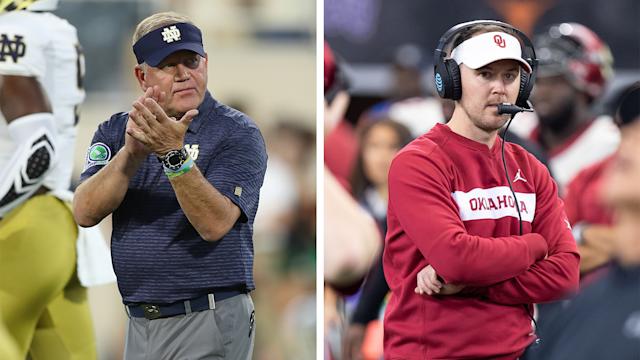College football coaching contracts are rewarding the wrong people
December 7, 2021
It feels like I’ve beaten this drum harder than Notre Dame usually beats its regular-season opponents, but here I go again. This past week’s coaching carousel spin shows why college athletes should be paid every bit the way their million-dollar-earning coaches are paid.
After 12 years as the head football coach at the University of Notre Dame, Brian Kelly headed south to take $95 million to fill the coaching vacancy left at LSU. After vowing to remain in South Bend and then bolting in the middle of the night, Kelly’s exit left Irish fans as enraged as they usually are after the team’s multiple playoff flame outs. The former lovable Notre Dame coach, charming and joking and always smiling, has allowed himself to become the biggest villain in America.
Somewhere, Lincoln Riley is smiling.
Possibly more outrageous than Kelly’s departure, however, is that his players, those he left and those he joined, are not allowed to earn even a fraction of the money that Kelly will be making.
As of now, the three highest-paid coaches in college football are aforementioned Riley (projected at over $10 million a year), Nick Saban ($9.7 million a year) and Kelly ($9.5 million a year). But where would these coaches be without the players that they beg to play for them? How much would their salaries drop if they didn’t have their four and five-star recruits at their disposal?
Ironically, all of those coaches are underpaid. All the money those coaches have gathered for their schools over their years make them worth double what they currently earn. Yet, in Alabama’s 24-22 Iron Bowl win over Auburn, it was Bryce Young who made a 28-yard touchdown throw with 24 seconds left to tie and send the game to overtime.
It is un-American that college athletes are forced to play three years of college football for no pay while risking the professional careers. They do get room, board and tuition, but the money they make for the school far outweighs the scholarship money they receive.
So, how wrong is it that players agree to come out of high school and spend three (for many, unnecessary) years playing a violent sport for no compensation because of a coach who all but implored them to play for him, and then that coach in turn leaves them behind for millions of dollars? It’s almost as wrong as Kelly’s fake Southern accent.
The players that Kelly, and Riley, recruited to their former school and promised to help send to the NFL risk their futures every week for these coaches. Now, these players, many of whom didn’t want to play in college to begin with, are now at a program without the coach who was the reason they went to the school in the first place.
Yes, these players have the opportunity to enter the transfer portal and maybe even follow their coaches to their new school, but how unfair is it that these young men agree to give up years of their lives for this coach and then have to rearrange their short-term future because that coach chose to chase the money his student-athletes can’t make?
The recent NIL deals that allow student-athletes to profit off their name, image and likeness, have let some athletes make money for themselves. Young, in fact, has already made close to $1 million with these new rules in play, but it’s the play of Young that makes him worth the $9.7 million that his coach makes.
The NIL money that many of these college athletes are making is chump change compared to their real value.
Now I do not blame Brian Kelly for wanting to leave Notre Dame for LSU. Coaching the Tigers is a better job than coaching the Fighting Irish — a better recruiting base, a better training facility and stadium. If a better job opened up for you and you had to accept it right there on the spot, would you not do it?
I don’t condone Kelly claiming he would not leave Notre Dame, and then the next day doing just that. The lying is unacceptable, but the job acceptance is understandable. When dozens of college athletes are affected by your choice, however, it’s only fair that these athletes get the same compensation that their coaches do.



